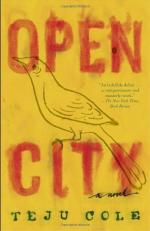
|
| Name: _________________________ | Period: ___________________ |
This test consists of 15 multiple choice questions and 5 short answer questions.
Multiple Choice Questions
1. What does Julius say the boys who beat him up and robbed him were intent on doing?
(a) Killing him.
(b) Making him afraid.
(c) Teaching him a lesson.
(d) Humiliating him.
2. How old does Julius say he was when his father died?
(a) 27.
(b) 22.
(c) 14.
(d) 18.
3. What does Julius say bound him to the boys who beat him up and rob him, the first time he saw them?
(a) Africanness.
(b) Blackness.
(c) Being men.
(d) Being New Yorkers.
4. What part of academia does Julius say he has never had a stomach for?
(a) The research.
(b) The needy students.
(c) The competition.
(d) The bureaucracy.
5. Why would Julius have thought that the Africans in Brussels all came from this one place in Chapter 11?
(a) Because of Belgium’s colonial relationship with that country.
(b) Because Belgium had agreed to resettle refugees from the civil war there.
(c) Because Belgium had adopted an open borders policy for refugees.
(d) Because of Belgium’s selective immigration policies.
6. What does Julius say his generation is the first generation not to be familiar with?
(a) Pollution.
(b) Mass death.
(c) Death in childbirth.
(d) Corruption.
7. What is the man doing in the subway cars, when Julius notices him on the 18th anniversary of his father’s burial?
(a) Looking for fare-cheats.
(b) Inspecting the lights.
(c) Inspecting the air conditioning.
(d) Changing the ads.
8. What does Moji say she actively worries about, during the picnic in Central Park?
(a) The climate.
(b) The economy.
(c) The environment.
(d) The inner cities.
9. What trait does Moji see in Julius that is consistent from the time he forced himself on her till the present moment?
(a) Distractedness.
(b) Callousness.
(c) Forgetfulness.
(d) Being judgmental.
10. How does Julius’ friend respond to the fact that the “tree of heaven” is an invasive species (179)?
(a) He says, "Aren’t we all?"
(b) He is angry at the person who introduced it.
(c) He is concerned about ways to eradicate it.
(d) He extolls the virtues of the tree.
11. When Julius goes to see Dr. Saito in the beginning of Chapter 14, what is Dr. Saito having a hard time with?
(a) Breathing.
(b) Walking.
(c) Bedbugs.
(d) Sciatica.
12. Whose obituary do the street performers make Julius think of?
(a) His oma’s.
(b) M.’s.
(c) V.’s.
(d) His father’s.
13. How does Julius characterize the effect Mahler’s symphony has on him?
(a) It stills his thoughts.
(b) It fills him with visions.
(c) It floods his heart with feelings.
(d) It filled his heart with light.
14. How long after Julius’ visit to Dr. Saito does Julius get a call saying that Dr. Saito has died?
(a) Several weeks.
(b) A week.
(c) A few days.
(d) Two months.
15. When Julius sees children on a playground on his way home from the appointment with his accountant in Chapter 13, what does he say the creak-creak of the swings signifies to them?
(a) That their parents are there to push them.
(b) That they are surrounded by familiar things.
(c) That they are having fun.
(d) That they need to be careful.
Short Answer Questions
1. What does Julius say he felt comforted by when he went to the tailor’s shop to get clothes for his father’s funeral?
2. How does Julius characterize Moji and Lise-Anne, respectively?
3. Flying back to New York, Julius remembers having seen the city from a similar vantage point: when looking a vast scale model of the city. Where was that scale model exhibited?
4. Where does Julius find out most Africans in Brussels actually come from?
5. Who wrote the cantatas Julius had heard at Lincoln Center, before coming to visit Dr. Saito?
|
This section contains 606 words (approx. 3 pages at 300 words per page) |

|




